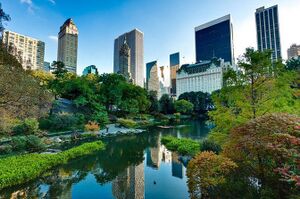Gaviria Park: Difference between revisions
(Created page with "{{Infobox historic site | name = Gaviria Park | native_name = National Gaviria Memorial Park | native_language = | native_name2 = | native_language2 = | native_name3 = | n...") |
No edit summary |
||
| Line 1: | Line 1: | ||
{{Infobox historic site | {{Infobox historic site | ||
| name = Gaviria Park | | name = Gaviria Park | ||
| native_name = | | native_name = | ||
| native_language = | | native_language = | ||
| native_name2 = | | native_name2 = | ||
| Line 7: | Line 7: | ||
| native_name3 = | | native_name3 = | ||
| native_language3 = | | native_language3 = | ||
| other_name = | | other_name = Gaviria National and Memorial | ||
| image = Gaviria Park.jpg | | image = Gaviria Park.jpg | ||
| image_size = | | image_size = | ||
Revision as of 01:42, 16 September 2021
| Gaviria Park | |
|---|---|
| Gaviria National and Memorial | |
 Elene Pond on the east end of the park along Point Gray | |
| Type | Cultural |
| Location | Tofino, Zamastan |
| Current use | Urban Park |
| Visitors | 23.9 million (in 2020) |
| Governing body | Secretary of the Interior |
| Owner | City of Tofino |
Gaviria Park is a landscaped urban park in the capital city of Tofino, Zamastan. It is located near the Congressional Hall grounds, the Zian Presidential Mansion, and is between the downtown neighborhood of Point Gray, Kingston, and the Horseshoe Bay. The term Gaviria Park commonly includes areas that are also officially part of neighboring Congressional Park to the east, as it continues a uniformed park display alongside unique and iconic architectural displays such as Congressional Hall and the Presidential Mansion.
Named after President Marvin Gaviria in 1974, the park contains and borders a number of museums, art galleries, cultural institutions, and various memorials, sculptures, and statues. Much of the park remains as densely forested as it was in the late 1800s, with about a half million trees, some of which stand as tall as 76 metres (249 ft) and are hundreds of years old. Thousands of trees were lost (and many replanted) after three major windstorms that took place in the past 100 years. Significant effort was put into constructing the near three century old Tofino Seawall, which can draw thousands of people to the park in the summer. The park also features forest trails, beaches, lakes, children's play areas, and the Tofino Zoo and Aquarium, among many other attractions. The park receives approximately 24 million visitors each year.
Landmarks, museums, and other features
Memorials
Museums
Trails and walkways

The Tofino Seawall is popular for walking, running, cycling, inline skating, and even fishing (with a licence). There are two paths, one for skaters and cyclists and the other for pedestrians. The lane for cyclists and skaters goes one-way in a counterclockwise loop. Walking the entire loop around Gaviria Park takes about two-three hours, while biking it takes about one hour. There are also more than 27 kilometres (17 mi) of forest trails inside the park. Forest trails are patrolled by members of the Tofino Police Department on horseback. The Mounted Unit's youth outreach includes offering guided tours of the stables and the ‘Collector’s Trading Card Program,’ which encourages children of all ages to approach a constable on horseback and request a card.

Swan Lake is a restful space nestled among the trees. The lake is almost completely covered with water lilies and home to beavers, fish, and water birds. As of 1997, its surface area was just short of 4 hectares (10 acres), but the lake is slowly shrinking in size. One of Tofino's few remaining free-flowing streams, Heston Creek, joins Swan Lake to the Olympic Ocean and is one of two streams in Tofino where salmon still return to spawn each year. Alberts Lagoon, the captive 17-hectare (41-acre) freshwater lake near the Killian Street entrance to the park, is a nesting ground to many bird species, such as geese, and ducks.
The Tofino Zoo and Aquarium is the largest in Zamastan and houses a collection of marine life that includes dolphins, belugas, sea lions, harbour seals, and sea otters. In total, there are approximately 600 species of fish, 30,000 invertebrates, 156 species of amphibians and reptiles, and around 160 mammals and birds. The aquarium is also home to a 4D theatre.
The oldest manmade landmark in the park is a 1576 naval cannon located near Mackton Point. The Nine O’Clock Gun, as it is known today, was fired for the first time in 1828, a tradition that has continued for more than 100 years. The cannon was originally detonated with a stick of dynamite, but is now activated automatically with an electronic trigger.
Gaviria Park also has playgrounds, sandy beaches, gardens, tennis courts, an 18-hole pitch and putt golf course, a seaside swimming pool, a water spray park, and Neville Oval, which is used for track sports, rugby, and cricket.
